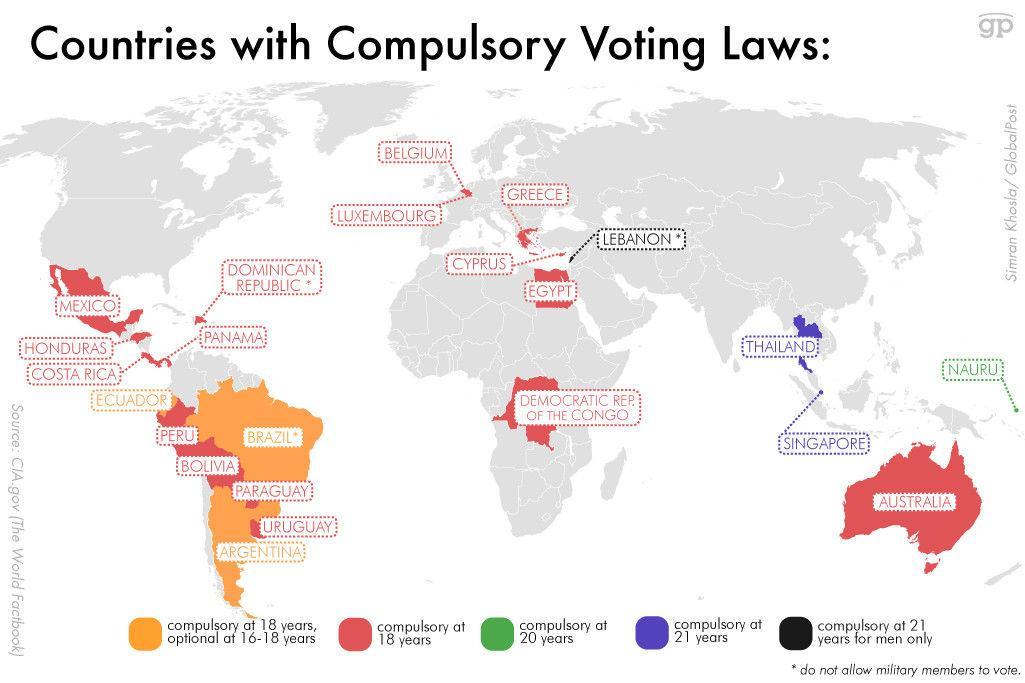Did you vote last November? If not, President Obama thinks maybe it’s time you were punished for it.
During a meeting with a Cleveland civic group Wednesday, the president mused aloud about the effects of mandatory voting laws.
To be clear, Obama is not suggesting you should go to jail for skipping out on Election Day. More than 20 countries have compulsory voting laws, and in most of them, failure to vote without a valid excuse amounts to no more than a fine.
The president thinks the U.S. could follow in the footsteps of countries like Australia, Brazil and Mexico and institute mandatory voting requirements. I’m inclined to agree.
Obama suggested mandatory voting laws would primarily increase representation of younger, low-income and minority voters. It’s on this point that I think compulsory voting would have the greatest positive effect.
One of the biggest obstacles to voting is that it is simply inconvenient. Last November, I had to fight traffic and drive 30 minutes to my hometown to vote in the midterm elections. I know other students who drove hours to do the same.
And I was lucky. I didn’t have work or class that afternoon, either of which would have prevented me from voting.
This goes double for low-income citizens struggling to get by, for whom taking the afternoon off to vote could mean skipping a meal or even getting fired. Let’s not forget that I never would have made it home to vote without a car, something many low-income people lack.
If we made voting mandatory, it would all but require a more convenient election schedule to avoid disproportionately punishing low-income people.
The solution is simple: Hold elections on weekends or establish voting holidays. Austria, Belgium, France, Germany, India and New Zealand are just some of the countries that have already put this policy into effect.
Similarly, compulsory voting would encourage the development of carpools, bussing or other transportation solutions to get people to the polls. Alternatively, the government could establish more polling places in areas where people are less able to get around town.
So far, we’ve established that compulsory voting, if handled appropriately, could make our system much more democratic by giving voice to people traditionally left out of elections. Yet many Americans oppose mandatory voting on the grounds that it would increase the influence of ignorant people on election results.
Yet, our current system is already plagued by ignorance. I’ve encountered innumerable people who exclusively consume Fox News and are avid voters. Or maybe, like many people I know, you don’t even follow politics and vote based simply on who your parents tell you to pick.
How are the two scenarios above any better for democracy than forcing everyone to vote?
Many reputable news sources are still biased in one way or another. It’s nearly impossible to get truly impartial coverage in an era where every headline is screaming sensationalism.
Even registering as a Democrat or Republican signals a certain reluctance to weigh both sides of every issue equally.
The difference between an “ignorant” voter and an “educated” voter is a murky one.
Of course, most complaints are thinly veiled politics. Neither Republicans nor Democrats appreciate the notion of mandatory voting encouraging more turnout for the other side. Some states have already passed restrictive voting legislation, most of which is seen to disproportionately hurt the previously mentioned groups.
According to the Brennan Center for Justice, these policies do things like make voter registration harder, make it more difficult for students to vote, reduce access to absentee ballots and limit early voting opportunities.
Mandatory voting legislation would put pressure on legislators to reverse course and expand voting rights or else be faced with huge numbers of furious constituents.
It’s shameful that anyone would want to restrict voting rights to help their party win elections, but it’s also hard to ignore the fact that Obama’s statement comes just months after Democrats’ crushing losses in the November midterms.
Still, mandatory voting has definite merits. With voter turnout lower than 37 percent of eligible voters in the 2014 midterms, according to the United States Election Project, it’s clear the government we have now does not represent most Americans and hasn’t for a long time.
Compulsory voting would help the disadvantaged people who need representation more than anybody while placing a minimal burden on everyone else. It would also encourage the government to improve voting infrastructure, making it more convenient for everyone.
If nothing else, you might get another holiday out of the deal.
Alex Mendoza is a 22-year-old political science and international studies senior from Baton Rouge. You can reach him on Twitter @alexmendoza_TDR.
Opinion: America should adopt compulsory voting laws
By Alex Mendoza
March 22, 2015
More to Discover








